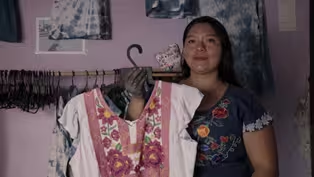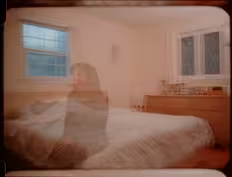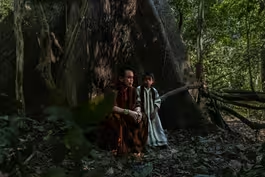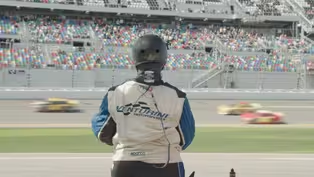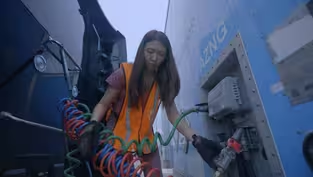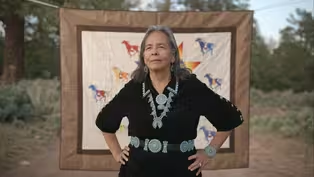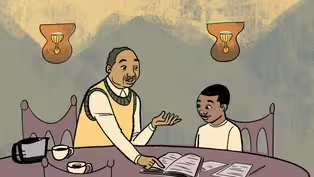
All Riders
Special | 16m 25sVideo has Audio Description
A close look at disabled New Yorkers fighting for accessibility on the MTA.
The subway makes New York City tick, but getting around is a constant battle for disabled New Yorkers.
See all videos with Audio DescriptionADProblems playing video? | Closed Captioning Feedback
Problems playing video? | Closed Captioning Feedback
Major funding for POV is provided by PBS, The John D. and Catherine T. MacArthur Foundation, the Wyncote Foundation, Reva & David Logan Foundation, the Open Society Foundations and the...

All Riders
Special | 16m 25sVideo has Audio Description
The subway makes New York City tick, but getting around is a constant battle for disabled New Yorkers.
See all videos with Audio DescriptionADProblems playing video? | Closed Captioning Feedback
How to Watch POV
POV is available to stream on pbs.org and the free PBS App, available on iPhone, Apple TV, Android TV, Android smartphones, Amazon Fire TV, Amazon Fire Tablet, Roku, Samsung Smart TV, and Vizio.

POV Playlist
Every two weeks, we curate a selection of POV docs, old and new, around a central theme. Stream while you can — until the next Playlist!Providing Support for PBS.org
Learn Moreabout PBS online sponsorshipMore from This Collection
The best and boldest independent short films, curated by America's longest-running documentary
Video has Audio Description
Listeners across Montana call Yellowstone Public Radio to share their views live on-air. (14m 6s)
Video has Closed Captions
A joyful portrait of Mermaid and Milan, chosen sisters and ballroom divas. (14m 41s)
Video has Closed Captions
Residents from Oaxacan town Niltepec alchemize blue indigo pigment from the jiquilite plant. (13m)
Video has Audio Description
Marisol Reina, an undocumented immigrant, reconnects with her family in her home country. (8m 43s)
Video has Audio Description
A Vietnamese American daughter captures her parents on 16mm as they dream of their homeland. (8m 4s)
Shirampari: Legacies of the River
Video has Audio Description
Set in the heart of the Amazon, a young Ashéninka boy must face his fears and catch a giant catfish. (15m 24s)
Video has Audio Description
The Race to Pit Row - NASCAR’s first black woman pit crew member. (14m 19s)
Video has Audio Description
A young med student drives big rigs for tuition fees. (11m 13s)
Video has Audio Description
Thao recounts the story of her family’s escape through the lens of her fascination with ants. (10m 24s)
Video has Audio Description
A glimpse into the lives of three quilters in the American West. (17m 14s)
a film is a goodbye that never ends
Video has Audio Description
Filmmaker María Luisa Santos grapples with saying goodbye to Turbo, a dog she has come to adore. (13m 44s)
StoryCorps Shorts: The Family Equation
Video has Closed Captions
Lynn Weaver and his daughter talk about his father who worked as a janitor and chauffeur. (2m 27s)
Providing Support for PBS.org
Learn Moreabout PBS online sponsorship♪♪ [ Elevator bell dings ] ♪♪ ♪♪ ♪♪ -My mom calls me the luckiest unlucky guy, which I think is really about as succinctly as you can put it.
On July 29, 2009, when I was doing my usual walk to work, get a little exercise, get some air, and just think about the day ahead... [ Footsteps ] ...a giant rotten limb fell from a tree as I walked beneath it in Central Park and clobbered me.
-[ Thud ] -What they found was that it probably hit me more or less on the head and the reason that I'm still here is amazing good luck.
After that moment, it's hard to think of it as good luck.
But there was a doctor, Rajiv Narula, who was jogging by.
He said, you know, "You obviously had an arterial bleed because the blood was coming out."
Da-dunk, da-dunk.
And that's -- that's kind of it.
If you -- If nobody finds you, you bleed out.
That's sort of it.
♪♪ So what does it mean to get around when you can't walk?
-Thank God there's no urine.
It smells not so bad over here.
Um, as elevators go, it's pretty good.
Pretty good, this one.
[ Indistinct conversations ] Thanks.
♪♪ Hmm.
You have to be very patient, very patient when you do this.
It's not good.
It's not good.
-Hello?
-This is one of the big stations in the city.
34th Street-Herald Square.
Jail.
This is jail.
This is jail.
Jail.
[ Chuckles ] -You could probably get in.
-Go ahead.
-You sure?
-So, my cousin Rosie -- intrepid young reporter.
"Sasha, you were telling me about those elevators in the subway not working, so I got my guy I work with to put in a FOIL, Freedom of Information Law request, to the MTA.
They sent him back a year's worth of the elevator outages from 2014 to 2015, one year."
I looked at it, I said, "Oh...This is bad."
Because there were 9,000 outages -- 9,000 elevator breakdowns over the course of a year.
And, like, that's a number that's hard to comprehend, right?
So I started crunching the numbers.
I had them in a big spreadsheet, and I said... What is that?
9.000 over the course of a year.
365 days in a year.
That's 25 per day.
Wait.
There's like more or less 100 stations that are even accessible in the first place.
So if 25 go out a day, that means like a quarter of the stations at some point during the day had an elevator that wasn't working.
What?
What?
It's not, like, understood that when an elevator is out at a station, that station is off limits.
It is closed for anyone in a wheelchair.
But who else?
It's parents with little kids.
Pregnant women.
Old people.
But also young people.
And any people who break their ankle and have -- you know, need of a cane.
It's a delivery worker pushing a case of soda on a hand truck.
It's our economy.
♪♪ -We are a city of people who take public transportation.
And if you don't have good, accessible transportation, you will never get out of poverty and impoverishment.
So we're really reinforcing historic discrimination and segregation through transit injustice.
♪♪ -Institutional discrimination kept walking in the door.
I mean, you couldn't get away from it.
They won't rent to me because I'm disabled.
They won't hire me because I'm disabled.
I didn't get into the school because I'm disabled.
-I now lift my pen to sign this Americans with Disability Act and say let the shameful wall of exclusion finally come tumbling down.
-The ADA passed in 22 months.
There's nothing like that.
Nothing this sweeping, nothing this big.
You have to act to accommodate a disabled person, and if you don't, it's discrimination.
-I think the entire management of MTA has been pretty bad historically.
They've always treated The Bronx -- even more particular, areas near the South Bronx -- as almost secondary customers for the MTA.
-How you doing?
-The MTA doesn't really care if we tend to get the bottom of the barrel.
-Alright, so, here we are at the Parkchester train station.
We're in front of the station right here.
If you can see that -- In front of the station, all this space here should have been utilized when they did the reconstruction a couple of years ago.
This is the area where the elevators should be.
There's a plaque here.
"MTA.
New York City Transit Authority.
Parkchester Station."
"Rehabilitated in 2012."
I don't know what that means.
"Rehabilitated" doesn't mean ADA compliance.
-What they do is they try to engage in legal jargon to figure out how they can avoid to comply with certain federal laws or state laws.
They're very adept at it.
They've been doing it for years.
We know that it's mismanagement, however we haven't been able to establish it, per se, because they guard their books like if it was a state secret.
♪♪ -You know, the MTA has this habit of renovating stations, major renovations, without adding accessibility.
Take the Enhanced Station Initiative, for example.
The Enhanced Station Initiative was a Governor Cuomo project to spend a billion dollars of taxpayer money to gussy up or enhance about 30 stations across the system.
Unfortunately, none of those stations were slated to improve elevators or any sort of accessibility components.
-What's the relevance for me?
Uh...
I don't need another picture of a dog.
Seems like a big waste of money to me, this one billion dollars.
-It's insulting for the MTA to undergo major renovations with taxpayer dollars to make a station shiny and glossy and new and not make that station accessible for all riders.
-Hey, hey, MTA!
We're not going to go away!
Hey, hey, MTA!
We're not going to go away!
-And we're here once again, because in Judge Hagler's courtroom at 10:00, which is a really simple case -- It's a case that says it's time to recognize our civil rights, everyone's civil rights, to ride the friggin' subway!
-The MTA has not only spent two and a half years fighting this case, gotten rid of one set of lawyers and gotten a new set of lawyers on the taxpayers' dime, but they keep delaying, not releasing documents, and insisting that they are above the law.
They're not above the law.
The American with Disabilities Act is the law.
It's not an option.
It's not a suggestion.
It's not "maybe later."
It's the law.
-Governor Cuomo -- Or Governor Cardboard was nice enough to join us today.
-[ Laughter ] -And he -- It's his show.
But it's not really so funny because Malaysia Goodson fell down the stairs and died with her stroller.
It's just not right.
-What do we want?!
-Elevators!
-When do we want them?!
-Now!
-What do we want?!
-Elevators!
-When do we want them?!
-Now!
♪♪ ♪♪ ♪♪ -Malaysia was an excellent mother.
She was always an ear for everybody to talk to.
-She was definitely more mature than all of us.
-I was at home when I heard the news that Malaysia died.
My whole world was upside down.
Everything just stopped.
The pain that I'm going through now, it's a pain I didn't even think exists.
I'm just imagining... as she was going down, what was going through her mind?
It's really a lot to take in it's where my baby took her last breath.
-Alright.
-Feels so funny just being in here.
[ Train wheels squeaking ] -[ Sniffles ] Look at this... Look at this.
-They need an elevator here for the same reason.
-[ Brakes squeal ] -[ Sighs ] It's gonna 10 months to the day on Thanksgiving... [ Woman on P.A.
speaking indistinctly ...that 'Laysia's been gone.
Yeah...
I would have never imagined that my baby wouldn't be here with us this Thanksgiving.
Her birthday is coming up.
[ Sobs ] [ Sobbing ] [Sobbing] Oh, God.
-It's terrible and sad, but... You know, people die in accidents every day, but this was one that didn't have to happen like that, because in any city with accessible transit, which is most other cities, she would have been taking an elevator or pushing that stroller up a ramp.
Thing is, New York has a huge advantage that we're throwing away because our rapid transit, our subway is not that deep underground.
Our subway is usually something like 12 to 20 feet underground.
We could build ramps in a lot of places.
So we build ramps, and then we can build much lighter-weight, less expensive, easier-to-maintain elevators.
-Leadership matters.
New York City Transit now has a new focus on accessibility thanks to hiring people like Alex Elegudin.
-My name is Alex Elegudin.
I'm the senior advisor for systemwide accessibility here at MTA New York City Transit.
I oversee accessibility for subways, buses, and our Paratransit division on behalf of the president.
I mean, having somebody with a disability working with those who are the decision-makers is the most collaborative and beneficial way to get change made.
"Here.
I'm empowering you.
Lead us on the push toward full accessibility."
I think that's how you get it done.
There are so many different disabilities.
Those disabilities interact with our transit system in so many different ways.
So by playing this role internally, I feel like I'm building the bridge, right?
I'd like to believe I represent the bridge from the community and the advocates to the executive and leadership here at New York City Transit.
We feel incredibly fortunate.
A historic investment into 70 ADA stations.
This is a tripling of the pace that we've usually done in five-year terms.
It really puts into perspective and hope that full accessibility may one day be a possibility.
"MTA Riding First Class."
[ Paper rustles ] How come I don't feel like first class?
-It's a plan.
It's another plan.
And the track record is not good.
I'll hold my applause for now.
-You know, the only thing I can say is just give us a chance to deliver.
But just saying that it's all talk, I think is -- is just -- it's just them being just critics and just, um, you know -- I would say maybe even going to a level where they're not supporting the cause itself by not letting us get on with our work.
[ Indistinct chanting ] -Government doesn't want to be held accountable and doesn't want to be pushed.
They want to be left alone to let them do their own thing when they're getting it done.
-Yes.
Oh, yes.
Yes.
-Accountability, efficiency, and transparency are not adjectives that anyone would use to describe the MTA.
-There is always a lot of factors.
People want to say, "Look.
it should just be accessible.
It's cut and dry and make it accessible."
But it's never that -- it's never that simple.
-Disabled, not disposable!
Disabled, not disposable!
Disabled, not disposable!
-Somebody has to get killed so we can do some things?
We're on a collision course.
-Recognizing that accessibility and inclusion is in all of our best interests takes vision.
-People with disabilities have a right to have the accessible New York that able-bodied people have, and they just don't.
-When you're talking about securing people's rights, many times the last line of defense are the courts.
-We need something like a legal binding agreement.
-What do we want?
-Elevators!
-And when do we want them?
-Now!
[ Train wheels clacking ] [ Train passing ] [ Man on P.A.
speaking indistinctly ] [ Beeping ] [ Indistinct conversations ] [ Train passing ]
Support for PBS provided by:
Major funding for POV is provided by PBS, The John D. and Catherine T. MacArthur Foundation, the Wyncote Foundation, Reva & David Logan Foundation, the Open Society Foundations and the...


